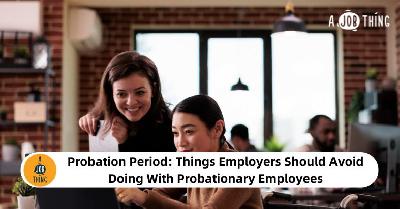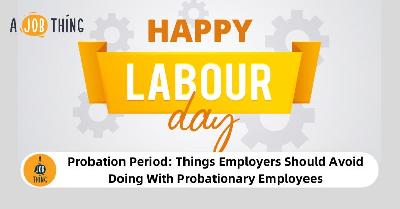
As HR, What Should You Do When A Manager is Failing?
Create Job Description Using AI
Write appealing job descriptions for any job opening to attract the most qualifield and suitable candidates. FOR FREE.
try now
HR is usually the first to notice when a manager is grappling with their performance.
There's an extraordinarily high turnover of personnel in their team. Absence levels in the department are higher than ever. Project deadlines keep shifting, and performance is going down.
In these situations, it's not hard to think that the manager isn't up to the job. But it's not always that easy. Often, there are underlying causes of why a manager may be struggling. A little bit of support and the right kind of intervention from HR can turn around the situation quickly.
So if you think that a manager is struggling, what are the key questions you should ask. What can you do to turn them from a declining employee into a top performer?
.jpg)
A struggling manager needs all the help they can get.
The manager doesn't have people skills.
People are regularly promoted into management positions because of their specialist or technical expertise. It's assumed that they will automatically be competent in managing their team because they are now in a senior role. But sending employees head-first into a position that requires managing people without any previous experience, training, or support is a bad idea.
Technical specialists usually don't have the high-level interpersonal skills required to engage, motivate, and grow a team. It's not because they are incapable of improving their self-awareness, but because they've never had to. They strive to hit the right note regarding managing performance either by taking a draconian style and continuously micromanaging or leaving employees to struggle without any guidance about priorities or expectations.
They have no idea on how to manage disputes that occur between co-workers and are concerned about tackling sensitive topics like stress. As an HR practitioner, if you see that the manager is in distress when it comes to people management, you must step in and provide guidance, support, and nurturing to help them become confident in their position.
Does the manager see the bigger picture?
It's natural for managers, especially middle managers, to feel so detached from the overall business strategy. They are too busy with the day-to-day quests of finishing the job and managing the team. They don't take a step back and think about the bigger picture.
The managers get entangled in internal politics and find themselves working to other people's agendas instead of their own. This situation is often worsened in companies where notable change is taking place or in fast-moving industries where the goalposts are always shifting. Suppose managers are not clear about the overall strategy. In that case, they often end up prioritising the wrong things and ended up being seen as unsuccessful or under-performing by their superiors.
.jpg)
All managers should be able to see the bigger picture to see what's really important in the long run.
HR has to open up the communication lines in the organisation so that managers know what they must do to turn strategy into action. Usually, this indicates working directly with the board to help them find the best method to share their goals that makes it clear how people's roles fit into the broader picture.
A consistent and transparent approach to performance management, where clear goals are set and regularly evaluated, plays a big part in helping managers lead themselves and their teams.
Does the manager need support?
A manager is often lonely. If someone has recently been promoted, they often find themselves isolated from their co-workers who used to be their support. Their co-workers may even have become their direct reports, which has changed their relationship. Some managers also feel that they need to be seen to know all the answers. They are worried about showing any weaknesses if it is thought that they are not good enough.
Managers feel lonely because they don't have the right internal support networks anymore. They don't have colleagues to bounce ideas off or to discuss issues with. They become more isolated, and without help, they will continue to sink.
Here is where mentoring comes in. If the company has a mentoring program, HR needs to encourage struggling managers. If there is no such program, it should still be feasible to help the manager find a co-worker who can mentor them or set up an informal peer support team where managers from different departments can cooperate and share issues.
Source: Cezanne
In need of hiring? Check out AJobThing!
Related articles
The 4 Types of Paid Leaves in Malaysia
HR Guide: Procedure and Templates for Leave Administration
Your Employee is Absent or Late Again! What Should You Do?





